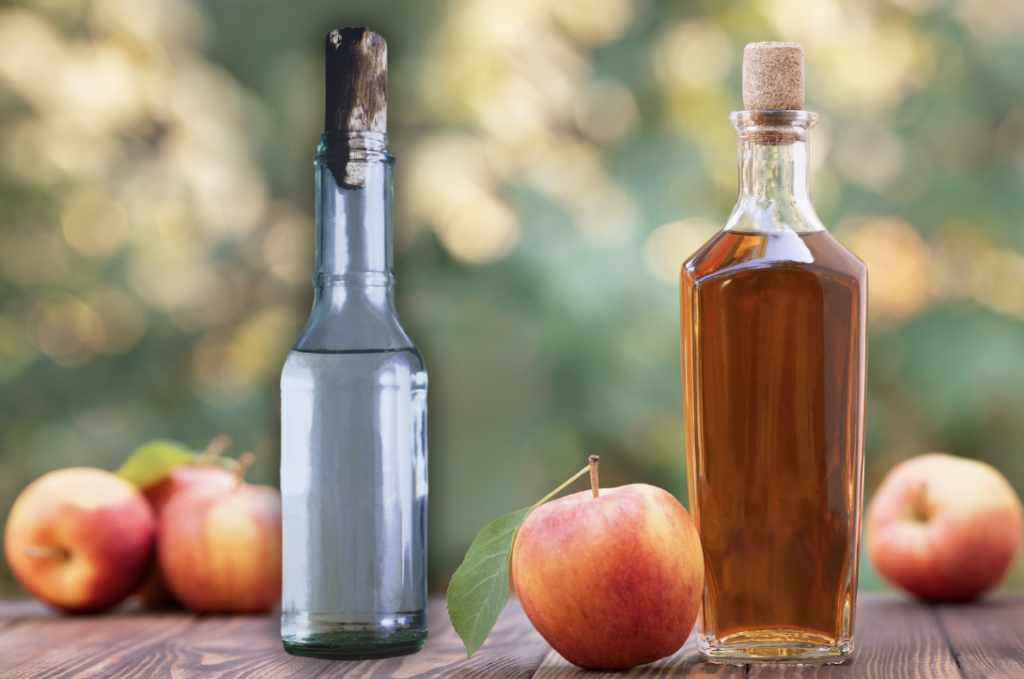What to Eat and Drink
Why Use Apple Cider Vinegar Instead Of White Vinegar
Looking for a healthier substitute for white vinegar? Apple cider vinegar could be the solution you’re looking for. With its tart flavor and various health benefits, it’s no surprise that apple cider vinegar is becoming increasingly popular in homes throughout the world. We’ll look at why you should use apple cider vinegar instead of white vinegar in this article.
Health Benefits of Apple Cider Vinegar
Apple cider vinegar has been linked to a variety of health advantages, including improved digestion, weight loss, and immune system support. It is also a natural cure for a variety of diseases, such as sore throats and acne. Apple cider vinegar not only includes helpful enzymes and antioxidants, but it also contains acetic acid, which has antibacterial characteristics.
Consuming apple cider vinegar has been found in studies to help manage blood sugar levels, making it especially advantageous for people with diabetes or insulin resistance. Furthermore, some research indicates that apple cider vinegar may help decrease cholesterol and enhance heart health.
Furthermore, apple cider vinegar has been shown to help in weight loss. It can help promote fullness, decrease appetite, and improve metabolism. Incorporating apple cider vinegar into your diet may help you lose weight.

Health Benefits of White Vinegar
While apple cider vinegar is well-known for its health benefits, it is crucial not to overlook the benefits of white vinegar. White vinegar is a powerful cleaning agent that may kill bacteria, germs, and mold. It’s frequently used to clean surfaces, sterilize kitchen equipment, and remove stains.
White vinegar has a culinary application as well. It is frequently used in the pickling process to preserve fruits and vegetables. White vinegar can also be used as a natural weed killer, removing undesired plants without the use of harsh chemicals.
Differences Between Apple Cider Vinegar and White Vinegar
The primary distinction between apple cider vinegar and white vinegar is in the manufacturing method. Apple cider vinegar is formed from fermented apple juice, whereas white vinegar is made from grain alcohol fermentation. This contrast provides apple cider vinegar its distinct flavor and amber color, as opposed to white vinegar’s clear and sharp taste.
White vinegar is more acidic than apple cider vinegar in terms of acidity. White vinegar has an acidity level of about 5%, whereas apple cider vinegar has an acidity level of about 4%. This minor change in acidity might have an impact on the taste and overall use of vinegars in certain recipes.
Cooking and Baking with Apple Cider Vinegar
Apple cider vinegar is a versatile cooking item. It gives meals a distinct tang and depth of flavor, making it a popular ingredient in salad dressings, marinades, and sauces. Apple cider vinegar’s acidity also helps to tenderize meats and balance flavors in dishes.
Apple cider vinegar can be used as a leavening agent in baking, giving baked goods a light and fluffy texture. It combines with baking soda to produce carbon dioxide gas, which aids in the rise of the dough.

Cleaning and Household Uses of White Vinegar
White vinegar is a strong cleaning product that may be used all over the house. Because of its acidity, it is efficient at removing stains, smells, and microorganisms. It can be used to clean kitchen countertops, cutting boards, and even in the laundry as a natural fabric softener.
Aside from cleaning, white vinegar can be used to unclog drains, remove mineral deposits from faucets, and kill weeds in the garden. Its flexibility and low cost make it a family staple in many households.
Skin and Hair Benefits of Apple Cider Vinegar
Apple cider vinegar is not only good for your internal health, but it is also good for your skin and hair. It can be used as a natural toner to balance your skin’s pH, prevent acne breakouts, and reduce the visibility of pores. Sunburns and itching caused by insect bites can also be soothed with diluted apple cider vinegar.
Apple cider vinegar can be used as a rinse in the hair to remove product buildup, restore shine, and promote scalp health. It promotes healthy hair development and relieves dandruff by balancing the pH of the scalp.
Other Uses and Applications of White Vinegar
White vinegar has a variety of different functions and applications aside from cooking and cleaning. It can be used in the garden as a natural weed killer, removing undesired plants without the use of dangerous chemicals. White vinegar can also be used to polish metals, remove stains from garments, and improve the air quality in your home.

Safety Precautions and Considerations When Using Vinegar
While apple cider vinegar and white vinegar have several health benefits, they must be used wisely and with prudence. Undiluted vinegar can be harsh on the skin and cause irritation, particularly in people with sensitive skin. Always dilute vinegar before using it topically.
Furthermore, excessive vinegar use might be harmful to your health. If you have any underlying health disorders or concerns, you should limit your consumption and consult a healthcare expert.
Conclusion
Apple cider vinegar offers me a range of health benefits and can be a flavorful addition to my culinary creations. Its versatility makes it a valuable ingredient in my kitchen, while its potential health benefits make it a popular choice for me as I look to improve my overall well-being.
However, it’s important to remember that white vinegar also has its own set of advantages, particularly in cleaning applications. Both vinegars have their place in different aspects of our lives, and it’s up to me to harness their potential.
So, whether I’m looking to improve my health or enhance my culinary creations, I’ll consider swapping out white vinegar for apple cider vinegar. My taste buds and body will thank me.


